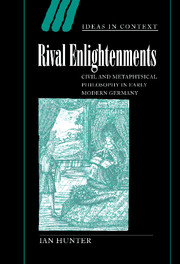Book contents
- Frontmatter
- Contents
- Preface
- Acknowledgements
- List of abbreviations and texts used
- Note on conventions
- Introduction
- PART I RIVAL ENLIGHTENMENTS
- PART II CIVIL AND METAPHYSICAL PHILOSOPHY
- 3 Leibniz's political metaphysics
- 4 Pufendorf's civil philosophy
- 5 Thomasius and the desacralisation of politics
- 6 Kant and the preservation of metaphysics
- Postscript: The kingdom of truth and the civil kingdom
- List of references
- Index
- IDEAS IN CONTEXT
6 - Kant and the preservation of metaphysics
Published online by Cambridge University Press: 22 September 2009
- Frontmatter
- Contents
- Preface
- Acknowledgements
- List of abbreviations and texts used
- Note on conventions
- Introduction
- PART I RIVAL ENLIGHTENMENTS
- PART II CIVIL AND METAPHYSICAL PHILOSOPHY
- 3 Leibniz's political metaphysics
- 4 Pufendorf's civil philosophy
- 5 Thomasius and the desacralisation of politics
- 6 Kant and the preservation of metaphysics
- Postscript: The kingdom of truth and the civil kingdom
- List of references
- Index
- IDEAS IN CONTEXT
Summary
INTRODUCTION
In this our final chapter we discuss Immanuel Kant's practical philosophy – his metaphysics of morality, law, politics, and religion – in relation to the conflict between civil and metaphysical philosophy whose history we have been essaying. Kant's philosophy, we shall argue, represents the decisive step in the modernisation of university metaphysics initiated by Leibniz, whose own embryonic programme had since been developed into a new and all-embracing form of Protestant scholasticism by Christian Wolff. Despite its lack of direct engagement with the writings of Pufendorf and Thomasius, Kant's philosophy thus remains deeply implicated in the intellectual civil war that continued to rage between university metaphysics and civil philosophy. Kant's role in this conflict, however, has become very difficult for us to discern, as the modern humanities academy is so saturated by Kantian styles of thought that we have come to treat them as timeless. This dehistoricising of Kant is reflected in the debate over whether he may be regarded as a metaphysician at all, rather than as the philosopher who simply uncovered the subjective conditions of human thought and morality (Gram 1967). It is also reflected in those histories that see Kant's philosophy as transcending religious, political, and cultural conflict altogether – as ushering in an epoch of Enlightenment in which all the old divisions would give way to a fully universal and autonomous conception of human reason, characterised by the virtues of Aufklärung, Selbstdenken, Perfektibilität: enlightenment, intellectual autonomy, perfectibility (Beck 1969; Beck 1984; Hinske 1990; Schneiders 1990).
- Type
- Chapter
- Information
- Rival EnlightenmentsCivil and Metaphysical Philosophy in Early Modern Germany, pp. 274 - 363Publisher: Cambridge University PressPrint publication year: 2001
- 3
- Cited by

